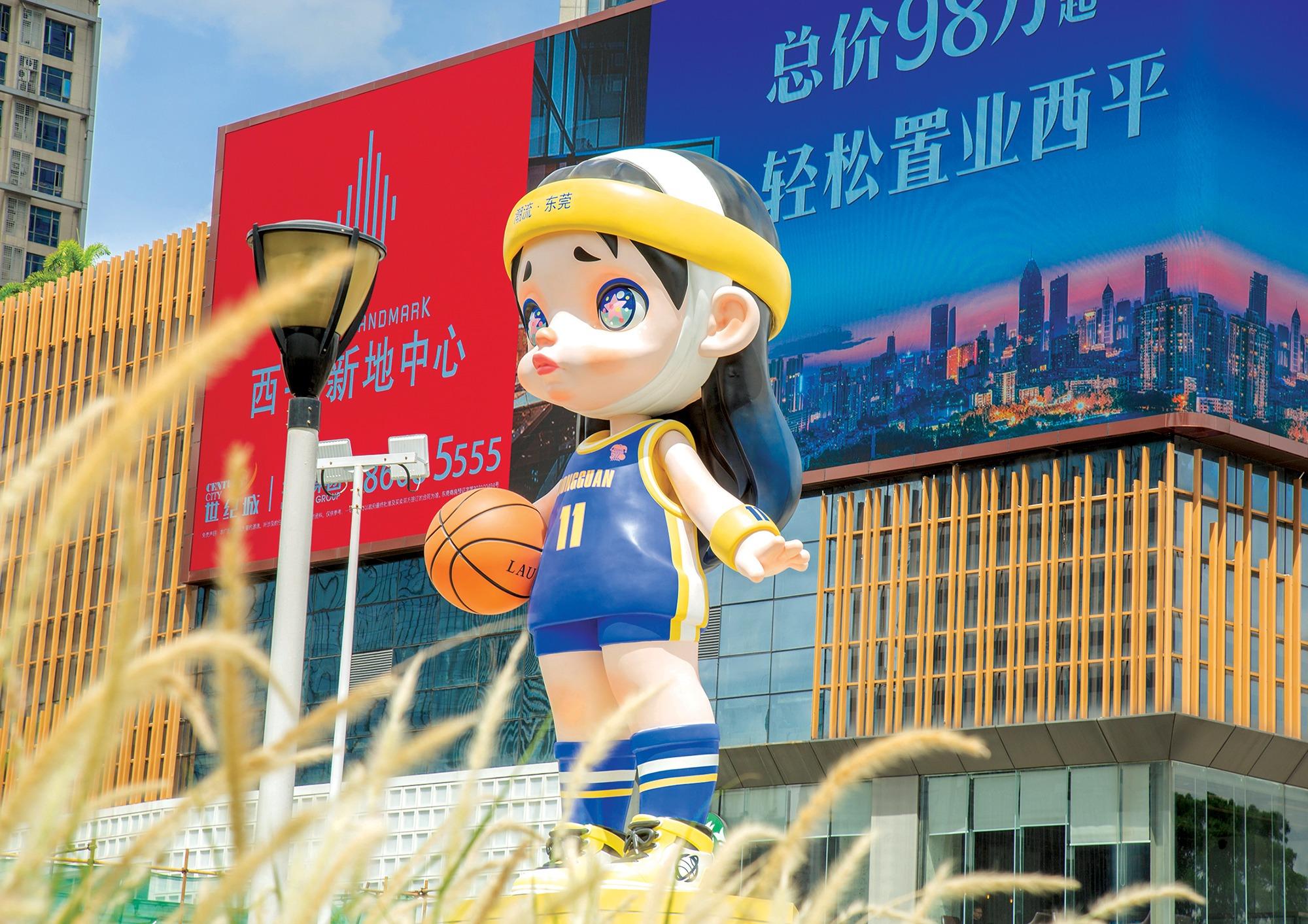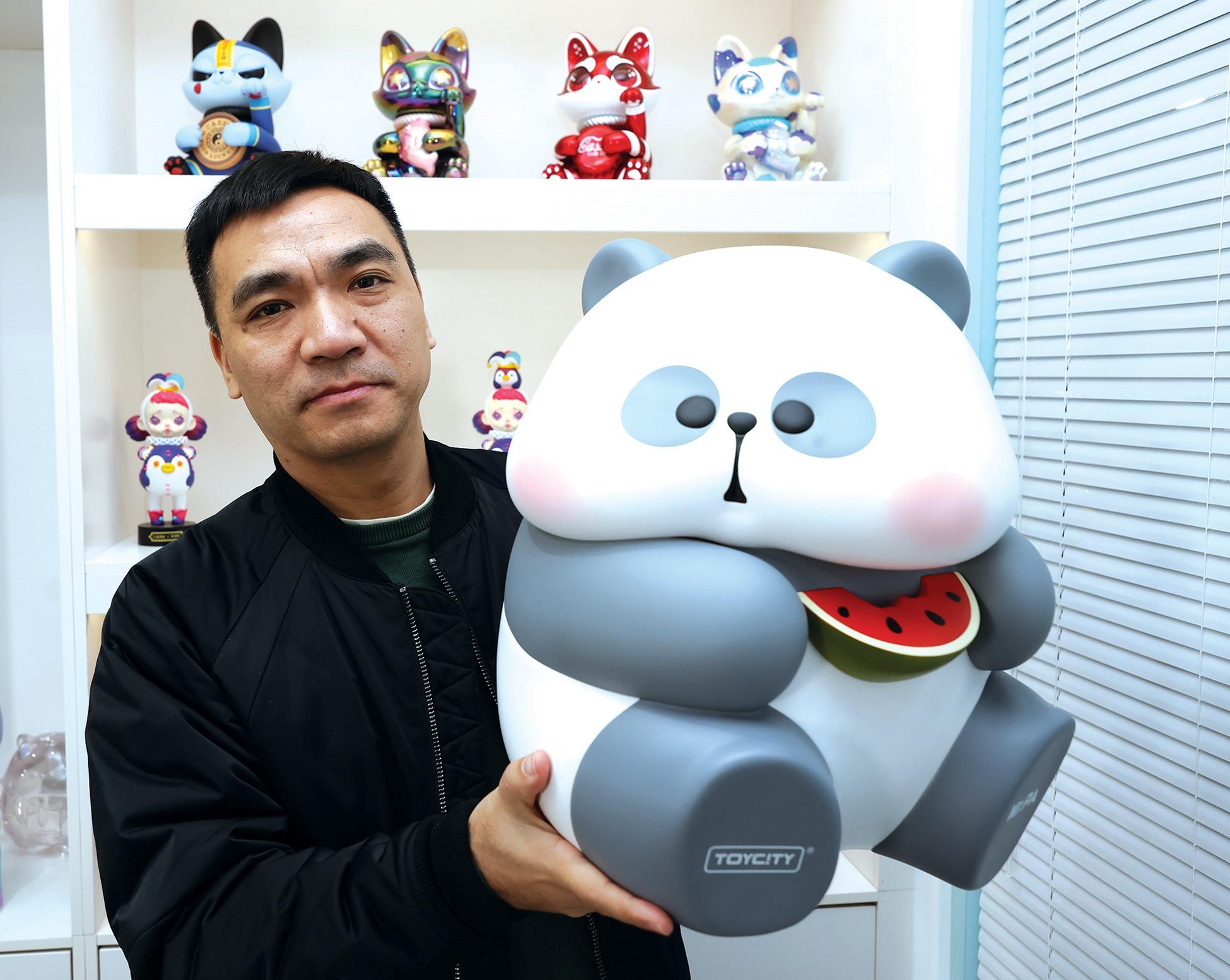 A huge toy figure — Laura — is on display at the city center in Dongguan. (PHOTO / REUTERS)
(PARKER ZHENG / CHINA DAILY)
A huge toy figure — Laura — is on display at the city center in Dongguan. (PHOTO / REUTERS)
(PARKER ZHENG / CHINA DAILY)
Laura, a lovely 12-meter-high doll statue, soars over downtown Dongguan. Representing a circus clown performer, she wears a white bandage on her head, denoting her rigorous daily training, with her eyes sparking like stars.
Laura — a favorite intellectual-property toy among youth in China — was created by a designer-toy firm in Dongguan incubated from an OEM (original equipment manufacturer) toy factory.
Dubbed the “world’s factory”, Dongguan is also a global manufacturing hub for toys, with more than 4,000 toy-production enterprises and nearly 1,500 factories upstream and downstream.
Techsun, founded by Zheng Bo in 2008, one of the toy factories, produces toy components for well-known brands like Gundam, Mickey Mouse, Transformers and Hello Kitty. “I earned my first pot of gold from manufacturing,” he said.
READ MORE: Dongguan emerges as a hub for talent and investment in GBA
But the company faced an acute shortage of orders several years ago, prompting Zheng to ponder how to revive his business. “With so many years’ experience, can’t we create our own orders, instead of completely relying on others?” he wondered.
In exploring new opportunities, Zheng faced setbacks along the way, having invested in the production of desktop 3D printers, believing it would be a promising market. He had focused solely on production without conducting thorough market research, leading to poor sales and pitfalls for the company.
Learning from his failure, Zheng recognized the importance of market analysis and customer demand. He subsequently established a dedicated marketing department to ensure a better understanding of the market, and to align the company’s efforts with customers’ needs.
With the rise of art toys and designer toy products in recent years, Zheng set his sights on creating his own designer-toy brand.
 Zheng Bo, president of ToyCity in Dongguan, displays Mr Pa, one of the company's most successful IP characters.
(PARKER ZHENG / CHINA DAILY)
Zheng Bo, president of ToyCity in Dongguan, displays Mr Pa, one of the company's most successful IP characters.
(PARKER ZHENG / CHINA DAILY)
The success rate for a conventional factory to build a brand was typically low amid concerns about business competition with their clients. When asked if he was worried about losing his clients, Zheng said he believes it all comes down to “making choices”.
In 2020, he decided to set up a new company called ToyCity, focusing on incubating and developing original IP images.
Laura was the startup’s first star. “At the time, we didn’t expect Laura to draw such tremendous popularity. You couldn’t imagine how many times we had to alter her figure, and the promotion plan,” he said.
Based on his years of experience in manufacturing, the entrepreneur is confident about the product’s craftsmanship, but he found that what’s lacking is a complete system for brand operation and IP management.
Compared with conventional OEM, Zheng said, the most challenging aspect of operating an original IP is brand management and promotion. Unlike factories, where expenses and production costs are easily calculated, brand operation requires a tremendous investment in intangible assets, like building awareness and cultivating a loyal customer base. For example, producing one minute of video content may cost about 50,000 yuan ($6,960).
ALSO READ: New district for cooperation with HK
ToyCity has yet to make a profit, but its intellectual property has grown from scratch to more than a dozen. Techsun’s output value reached 230 million yuan ($31.97 million) last year. When it launched an online store on e-commerce platform Tmall in 2020, its sales during the “Double 11” shopping festival amounted to only 8,000 yuan — a figure that soared to 4 million yuan at the time of the festival last year.
The challenges did not deter Zheng from creating an IP brand and adopting a positive outlook for the future development of the designer toys market.
Zheng has set up two new teams in ToyCity dedicated to animation production and the international market. For manufacturing, a new Techsun industrial park, covering 80,000 square meters, is expected to open this year. The company will also launch a “transparent” factory to enable tourists to observe the process of making toys and customize their own dolls.
Dongguan is vigorously developing the art and designer-toy industry on a large scale, and is already producing 85 percent of the designer toys sold in the country. The city was recognized last year as the “capital of art toys in China” by the China Toy and Juvenile Products Association. In October, the China Art Toy Center in Dongguan’s Shipai town went into operation, providing a platform for production, design, operation, exhibition and sales.


